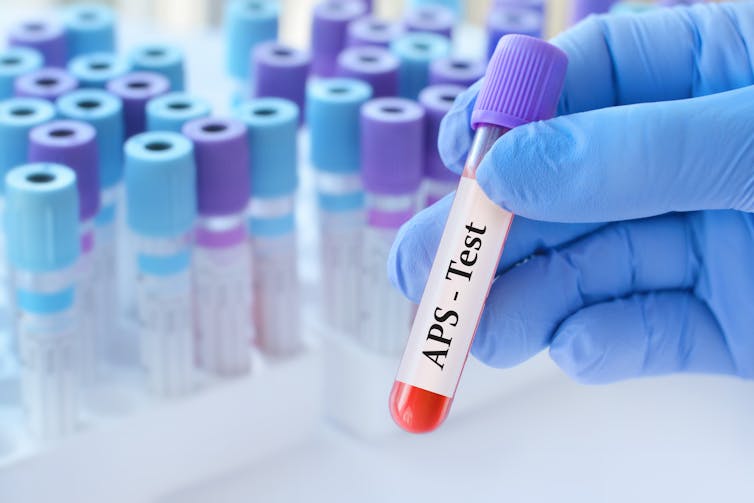Pregnancy brings unique challenges for people with autoimmune diseases – but with early planning, pregnancy outcomes can be greatly improved
- Pregnancy brings unique challenges for people with autoimmune diseases, but early planning can greatly improve pregnancy outcomes.
- Women with autoimmune diseases are at a higher risk of complications during pregnancy, including preterm birth, preeclampsia, and stillbirth, due to the effects of inflammation on the body and imbalances of the immune system.
- Pregnancy and postpartum periods can sometimes lead to remission or flares of autoimmune disease, which can impact pregnancy outcomes; certain blood tests can provide clues about a person’s risk for complications.
- Medications used to treat autoimmune diseases can harm a developing baby or reduce fertility, but some medications can improve pregnancy outcomes in people with autoimmune diseases; careful planning and discussion with healthcare providers is essential.
- Women with autoimmune diseases should discuss their individual risks and options with their rheumatologist or other specialists when thinking about pregnancy, and consider seeking guidance from organizations like the American College of Rheumatology for evidence-based recommendations on reproductive health care.

Only a few decades ago, a diagnosis of lupus could mean giving up the dream of having children. Women with systemic autoimmune diseases like lupus were warned that pregnancy was too risky – both for them and their unborn babies. Fast forward to today, and the story is remarkably different.
Thanks to scientific research and medical advances, pregnancy outcomes have greatly improved over the past several decades, and the outlook for pregnancy in people with autoimmune disease is more hopeful than ever.
However, pregnant women with autoimmune diseases still face a far higher likelihood of having serious complications, including preterm birth or even fetal loss. So while the outlook has improved, navigating pregnancy with these conditions still comes with a unique set of challenges and considerations. This is due to the medicines used to treat the disease, the effects of inflammation on the body and imbalances of the immune system, including some that researchers like me don’t yet fully understand.
I’m a rheumatologist and biomedical researcher with medical training and expertise in rheumatology and reproductive health. Rheumatology is a medical specialty that treats people with systemic autoimmune and inflammatory diseases, like the ones discussed in this article. We’re sometimes thought of as arthritis doctors, but systemic autoimmune diseases can involve the whole body, and we care for all of those effects.
I think it is essential that women with autoimmune diseases are equipped with a realistic understanding of their potential pregnancy journey – both the advances that have made motherhood more possible for them and the risks that still remain.
Autoimmune diseases disproportionately affect women
Systemic autoimmune diseases are chronic medical conditions in which the immune system, which normally protects the body from infections, mistakenly attacks the body’s own tissues. These conditions can include lupus, rheumatoid arthritis and antiphospholipid syndrome, to name a few.
Some autoimmune diseases attack only one part of the body. For instance, the thyroid is the only part of the body targeted in a disease called Hashimoto’s thyroiditis. But in systemic autoimmune diseases, the immune system can attack multiple parts of the body, like the skin, lungs and kidneys in those with lupus.
Autoimmune diseases disproportionately affect women. Lupus, for instance, occurs nine times more often in women than in men, and rheumatoid arthritis is three times more common in women. Since many women are diagnosed with these conditions in their 20s and 30s, when women are in their prime childbearing years, pregnancy can introduce new and unexpected challenges to their health care.
Increased pregnancy complications
Preeclampsia – a high blood pressure complication of pregnancy – preterm birth and stillbirth all occur at higher rates in women with autoimmune diseases. This is especially true for women with lupus and a condition called antiphospholipid syndrome. Women with these autoimmune disorders are five times more likely to experience these complications.
Autoimmune diseases are also linked to higher rates of miscarriage and postpartum depression.
Some women with lupus and a condition called Sjogren’s syndrome have an antibody in their blood that can cross the placenta and cause a rare but serious congenital heart condition. Studies have also found higher rates of autism spectrum disorders in women with autoimmune diseases.

Nastasic/E+ via Getty Images
Testing and early planning can improve outcomes
Fortunately, thanks to advances in research and medicine, doctors and researchers like me now have helpful tools to assess a woman’s individual risk. This allows people with autoimmune diseases to better understand and manage their health before getting pregnant.
Pregnancy and the postpartum period can sometimes lead to remission, which is a time when inflammation and the disease are quiet, and sometimes lead to flares, or flare-ups, when inflammation increases and the disease is very active. Importantly, women who conceive while their autoimmune disease is quiet, rather than during a flare, have healthier pregnancies. By waiting for a time when one’s autoimmune disease is in remission, a woman can improve her chances of a healthy pregnancy.
Certain blood tests can also give clues about a person’s risk for pregnancy complications. For example, a positive test for lupus anticoagulant, a blood test that looks for certain proteins that can increase the risk of blood clots, can identify women at the highest risk for preeclampsia, preterm birth and fetal loss.
Some women also have antibodies that target proteins inside their cells, called Ro, which are often found in people with Sjogren’s syndrome. If a pregnant person has high levels of anti-Ro antibodies, they are at risk for a serious pregnancy complication called fetal heart block. The good news is that certain medications can lower these risks in women who have these antibodies.
Medications and pregnancy
Researchers and rheumatologists like me also better understand how medications affect pregnancy, in both harmful and helpful ways.
Several medications that are commonly used to treat autoimmune diseases can harm a developing baby or reduce fertility. If a pregnancy is being planned, these medications must be stopped ahead of time and replaced with pregnancy-safe medications.
In cases of unplanned pregnancy, stopping potentially harmful medications quickly can be critical. For those not planning pregnancy, using effective birth control is an important safeguard. Notably, contraception choices can also be influenced by a woman’s underlying autoimmune disease and should be discussed with the person’s rheumatologist or other specialists.
On the other hand, some medications can improve pregnancy outcomes in people with autoimmune diseases. For example, a medication called hydroxychloroquine can reduce the risk of anti-Ro antibody-mediated fetal heart block. Low-dose aspirin taken during pregnancy can lower the risk of preeclampsia.
And recently, a study found that a drug named certolizumab improved pregnancy outcomes in women with antiphospholipid syndrome, which is an autoimmune condition with high rates of pregnancy complications.
Historically, pregnant women were excluded from research studies, but this is starting to change, which could lead to safer pregnancies for those with autoimmune disease.

SyhinStas/iStock via Getty Images Plus
Looking ahead
With all this in mind, it’s important for people with systemic autoimmune disease to talk with their rheumatologist or other specialists when thinking about pregnancy and throughout the process. Planning ahead gives the best chance for a healthy pregnancy.
Still, even with careful planning, autoimmune disease flare-ups can happen during pregnancy, and treating them promptly is important for both the mom and the baby.
Ongoing care after delivery matters, too, as postpartum flares can interfere with a mother’s ability to care for her newborn. Fortunately, there are safe options available to treat flare-ups during pregnancy or breastfeeding.
Talking to your doctor
With better treatments and growing knowledge, most women with autoimmune disease are now having healthy pregnancies and thriving babies. Fertility options like in vitro fertilization are also safe for many with autoimmune diseases.
Some helpful questions to consider asking your rheumatologist include:
- What should I expect if I want to get pregnant?
- Is my disease under control enough to try for pregnancy now?
- Are my current medications safe if I become pregnant?
- Do I need to stop or start any medications before trying to conceive?
- What are my chances of having a healthy pregnancy?
- What are the possible complications I could face during pregnancy?
- What treatment options would I have if my disease flared up during pregnancy or after delivery?
- If I need to wait to get pregnant due to active disease, how long should I wait, and what contraception is best in the meantime?
The American College of Rheumatology and the European Alliance of Associations for Rheumatology offer clear, evidence-based recommendations for pregnancy.
There are also clinical tools available to rheumatologists and resources available to patients to help guide safe, personalized reproductive health care.
I believe it’s essential to have a care team that’s comfortable guiding you through these decisions, and it’s always OK to ask questions or explore additional resources.
![]()
Kristen Demoruelle receives research funding from the National Institutes of Health, Boehringer Ingelheim, and Bristol-Myers Squib for research projects that are unrelated to the topics in this article.
